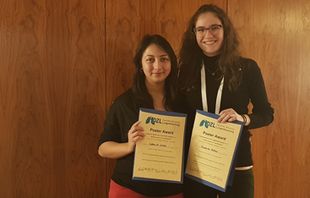With strong participation from the DZL's Munich site (CPC-M), the 2020 DZL Annual Meeting took place in the Baltic Sea resort of Travemünde. Five highlight talks were given by scientists from the CPC-M: In the field of asthma, the director of the CPC-M Prof. Dr. Dr. Erika von Mutius focused on the success of the ALLIANCE study. More than 1,000 children are now taking part. An important result, says Erika von Mutius. The many forms of bronchial asthma from childhood to adulthood can now be better investigated:
"We are currently particularly interested in children with a progressive chronic course of the disease from early childhood and have seen in initial analyses that genetic factors and exacerbations contribute to this."
Prof. Anne Hilgendorff (CPC-M) spoke for the field of DPLD (Diffuse Parenchymal Lung Disease). She referred to the identification of new pathomechanisms and the efforts to translate these into meaningful therapeutic approaches. In this context, a milestone in the field of DPLD is the currently emerging Cell Atlas of the Lung - an outstanding tool for a better understanding of fibrotic lung diseases.
Further highlight presentations were given by Dr. Tom Conlon (CPC-M, as representative for Gizem Günes) for COPD, Dr. Michael Gerckens (CPC-M) for Platform Imaging, Dr. Nicole Strobl (University of Munich/CPC-M) for End Stage Lung Disease and Meshal Ansari (CPC-M) for Diffuse Parenchymal Lung Disease.
Three young scientists from the DZL site Munich were particularly pleased: Their teasers/posters were awarded as the best in the respective disease area:
The PhD student Meshal Ansari, for example, combines lung research and machine learning in her project. She examines changes in the cells of patients with pulmonary fibrosis and compares them with data from large, existing studies (cohorts). The goal: to train algorithms that help physicians to improve the treatment and medication of patients.
Friederike Häfner (doctoral student) received the poster prize for her work on bronchopulmonary dysplasia (BPD) in premature infants. She investigates pulmonary arterial flow using MRI-based measurements. Her aim is to find out whether these measurements allow an earlier diagnosis of circulatory disorders in premature infants with BPD.
Third prize winner is PhD student David Bodensson for his poster on a new diagnostic method of endomicroscopy, PCLE. It enables to visualize the finest microarchitecture in the walls of the alveoli. He also combines the results with machine learning methods. The goal here: To better differentiate and diagnose the various interstitial lung diseases.


